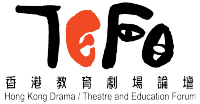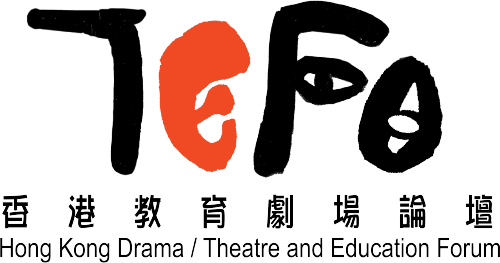Archiving and reporting on the arts is just as important as the execution of artistic practice by itself.
The archival and recording of theatrical work may not be a part of creating the actual work, but it makes sure that theatrical happenings live beyond their ephemerality.
Careful recording and detailed reflections are extensions of the creative process behind any performance, educational program or workshop, and can become valuable learning resources for the entire field.
At TEFO, we’ve always been thinking about how to fulfill our responsibility to develop ourselves as a networking and consulting organization for other practitioners in this field, and we hope that the principle of “Shared Knowledge” can continue carrying us forward in this work.
Thus, we are continually working to strengthen our online database’s ability to gather, organize and preserve applied theatre practice here in Hong Kong, so that our field’s research, records and archives can inspire present and future generations of applied theatre practitioners.
Please note that our English database is still under construction, and there may not be as much content as our Chinese database. For more resources, please visit the Chinese version of our website.
Changing Practice?− Exploring the potential contribution of applied theatre training to capacity building for NGO workers in China
Does applied theatre training contribute to capacity building for NGO workers in China? If so, how, and what factors might support or inhibit its effective application? This study adopts a blend of reflective practitioner research and action research as methodology centring on an applied theatre training workshop with a group of Chinese NGO workers. It draws from adult education literature in the area of experiential theories of adult learning and pedagogy, and the growing literature related to applied theatre and drama education. Both of these literatures raise theoretical issues concerning holistic learning and mindful and reflective practice, and a wide range of relevant categorisations of learning paradigms, fields and modes is canvassed.
A Practical Study of the Application of Active-inquiry Process on Theatre Play: Using the Experience of Creating the Play, Battle for Hong Kong 1941, as an Example(Chinese)|DaTEAsia Vol. 9
The study draws on the playwriting experience of the play for museum theatre, Battle for Hong Kong 1941, to examine the creation of interactive theatre and the design of the interactive section through the active-inquiry process from the point of view of an implementer. The researcher is also the playwright and the designer of the play’s interactive section.
TEFO x Chris Cooper: The Art of Facilitation — A Bridge Between Two Worlds 【Activity Report】
Facilitation as a Worldview By Valerie Jane Kwok “Facilitation isn’t a problem-solving technique, it’s aworldview,” Chris Cooper asserts in the introduction to his three-day workshop. Cooper expands on this statement by stating his belief that educators need to be more like facilitators rather than teachers, because the art of facilitation contains the pedagogical practice and theory that enables deep experiential learning and critical thinking in students. His three-day workshop brought a group of drama educators, social workers, actors and teachers together to explore the practice of facilitation of a Theatre-in-Education...
Analyzing Audience Responses: The Case of 1894 Hong Kong Plague Theatre in Education Programme | DaTEAsia Vol. 6
Theatre in education (TIE) is a form of applied theatre that concerns the use of theatre and drama for educational purposes. It is interventionist in nature, and deploys different modes of audience participation to engage its audience within or out of the dramatic acts to explore the issue at stake. Students are invited to revisit and reflect on the knowledge they received and rethink what they have taken for granted. Then a crucial question that follows: What would make the most useful methods of analyzing audience responses in a TIE programme? What is the learning process through theatre like? This paper discusses these questions by drawing findings from a study of TIE programme, 1894 Hong Kong Plague, conducted in Hong Kong in 2014. The programme intended to offer an alternative discourse to the local plague history by utilizing a stylized form of theatre performance and a set of pre- and post-performance activities. In light of Anthony Jackson’s framing in educational theatre and Stuart Hall’s encoding-decoding theory of communication, the paper analyses what attracted and distracted the young audience at 1894 Hong Kong Plague programme. It examines the process through which the students negotiate their live aesthetic encounter and their understanding of the history at issue. At the end, the paper reflects on the implications of the case for TIE audience study.
How to Use T.I.E. Skill to Tell History – Use the Play Opening the Gate in 1895 as Example|DaTEAsia Vol. 1
This paper will focus on how to use T.I.E skills to tell the history during the colonization of Japan. In 1895, due to the failure in the Sino-Japanese War (1894-1895), the Qing government was forced to sign the Treaty of Shimonoseki in which Taiwan was ceded to Japan and became a Japanese colony. The play Opening the Gate in 1895 uses the form of T.I.E to tell the story of this disturbing period. In the play, some interactive theatre skills from T.I.E, such as role play, meeting, image theatre, and hot-seating, are used in the process of the performance for presenting the major issues at the time, such as dilemma of Taiwanese people at the time—whether they should open the gate and allow the Japanese Army to enter the city or not, and the issue about the confusion of Taiwanese identity.
‘Being in the State of Crossing’: Drama Education and Transnational Space|DaTEAsia Vol. 1
One of the results of globalisation is that increasing numbers of students from different cultural and linguistic backgrounds come together to learn in one space. This article theorises an ethical approach to this challenge for drama educators, drawing principally on theories of transnational fiction (Stephen Clingman)(1), cosmopolitan ethics (Kwame Anthony Appiah)(2) and cultural understandings of space (Doreen Massey)(3). The central metaphor of drama as a means for ‘navigating boundaries’, it argues, is more politically apt if less ‘sexy’ than Giroux’s more commonly cited metaphor of ‘border crossing’. The relationship between this theory and an ethical drama praxis is illustrated by examples drawn from work carried out by two Asian postgraduate students currently studying at the University of Warwick.






